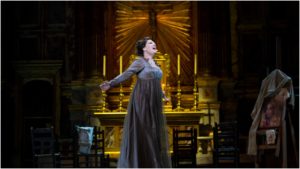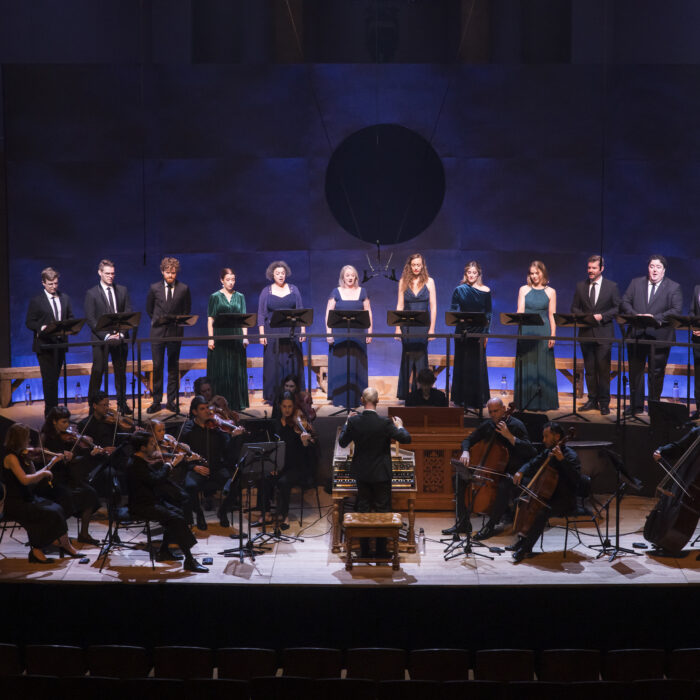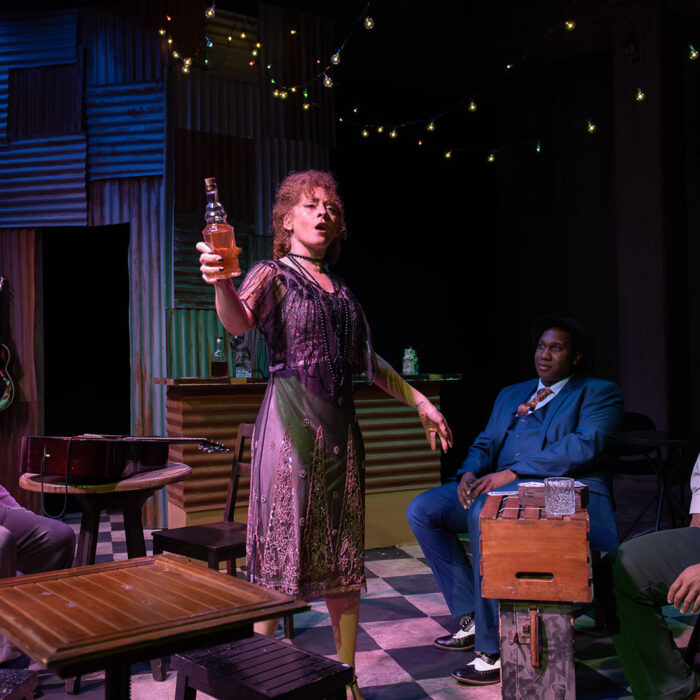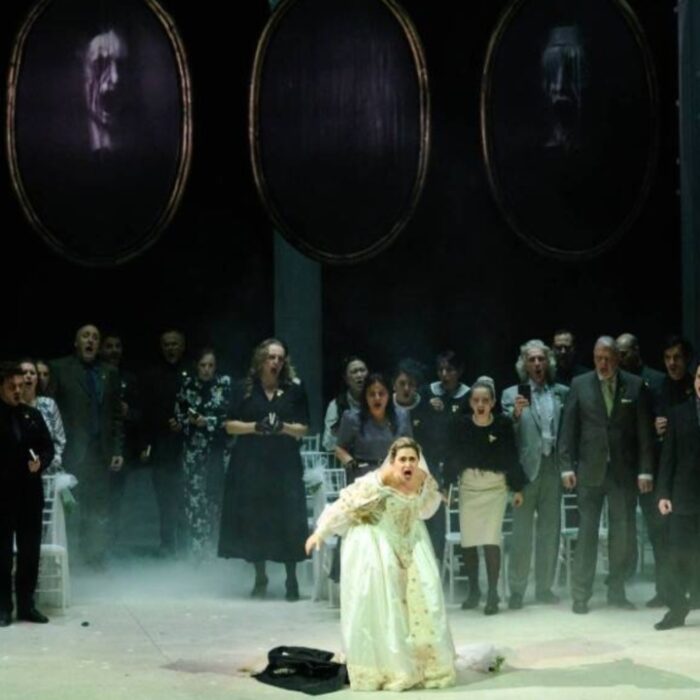
Metropolitan Opera 2018-19 Review: Tosca
Sondra Radvanovsky Is On A Different Level As Puccini’s Tragic Heroine
By David SalazarPuccini’s “Tosca” received its 966th performance at the Metropolitan Opera on Thursday, Oct. 25.
The work featured the second revival of David McVicar’s production from last season, with some unique distinctions. As noted in last year’s review of this production, this version of the work’s success will live or die based on whether the performers bring a strong perspective to the opera and make it their own.
Fortunately for the Met and company, they brought the right artist to take on the main character.
True Diva
Sondra Radvanovsky is like fine wine. She just seems to get better and better with time, her singing more powerful and secure, her characterizations more complex and fascinating. She doesn’t just sing and act, she does both at the same time, acting through her singing and singing through her acting.
And as Puccini’s most iconic diva, she was at a level that few others today manage to obtain.
As she graced the stage (fortunately wearing the same gown Anna Netrebko wore instead of the white pajama-looking dress that McVicar made Sonya Yoncheva enter with), she was greeted with applause. She had earned that from before when her cries of “Mario! Mario” offstage filled the hall with luscious sound. Throughout that opening duet, we got the sense of Tosca as a younger woman, with tremendous emotional instability. In one moment she was jovially flirting with Cavaradossi, Radvanovsky transforming the high B flat on “salir le voci delle cose” into the apex of a giggle. At another point, she admonished him with more aggressive consonants and potent tone as she saw the painting. But her sound retained a freshness and consistency that would become a touchstone of her entire evening.
One area where many sopranos falter in this role is in the lower notes that permeate much of the music in the second act. But the core of Radvanovsky’s voice retains fullness and versatility in the lower area, never feeling forced or pushed. As a result, such a passage as “son io che così torturate! Torturate l’anima sì, l’anima mi torturate,” with the vocal line descending from an A natural down to a D natural just above middle C, retained resonance and clarity in the soprano’s voice. She could shape the descent with intensity, never sounding like she was gasping for air as she observed the rallentando molto and diminendoed. In other moments, sopranos tend to speak text because it makes it easier than singing it so low; Radvanovsky rarely resorted to this measure and came out better for it.
She made it all sound easy, no note too challenging or out of her range, always in service of the dramatic moment. For example, after Cavaradossi is forced out for his cries of “Vittoria,” Tosca is tasked with an epic high C natural, which is only a dotted quarter note in length in the score. But Radvanovsky held it for the full length of the four-beat measure and conductor Carlo Rizzi seemed to expand the tempo ever so slightly to allow the note greater space and time. It was one of the visceral highlights of Radvanovsky’s second Act, coming through as THE cry of desperation and suffering after so much torture (this was probably the fourth or fifth high C that she had to sing to this point and they all sounded perfect). You could feel like this woman was about to implode and crack under pressure, she just couldn’t manage it any longer.
She lived the torture scene as I’ve yet to see many live it. She looked intent to stand up to Scarpia in the early going, but as the scene unraveled, so did she. Radvanovsky’s Tosca repeated stood behind Scarpia’s desk as if it was a protective boundary from him and attempted to run from his persecution of her around the room. When he finally did seize control of her, the soprano looked completely overpowered. She tried to break free from him, but each time she kept losing more and more control, her singing turning into cries for help; you could almost hear her shivering with fear in her voice. It was real.
So when she finally got her vengeance (Radvanovsky gave us every single beat of the decision to kill him masterfully), there was true sense of catharsis, her cries of “Muori” growing and growing in intensity. As an added direction, Scarpia’s hand seemed to grasp hers tightly in his final moments. As she tried to fight free, she shouted out the three repetitions of “Muori,” giving the text added meaning and conflict.
(As a side note, Radvanovsky finally made a change to the directions that McVicar originally gave of having Tosca “whisper” from across the room to Mario to ask for permission to speak. Both Yoncheva and Netrebko observed this (I did not see Rowley’s interpretation), but Radvanovsky actually runs toward the door to try and save her man, only to be stopped in her tracks.)
“Vissi d’arte” was on another expressive plane altogether, the legato in Radvanovsky’s voice simply sublime, particularly in the messa di voce on “diedi fiori agl’altar.” You could feel the momentum and build toward the climactic B flat on “perchè Signor,” the soprano sustaining the B flat into the A flat that followed before a glorious portamento brought us to the ensuing G natural; this entire phrase just screamed with incredible pain. And to top it off, the soprano finished the aria with a hushed “perchè me ne rimuneri così,” the final E flat coming with a crescendo that she wound up blasting into the hall to explosive applause. Throughout, you could sense the suffering melded with longing and an overall sense of helplessness that fit in perfectly with how Radvanovsky shaped the character throughout the act.
By the time Act three came, all you wanted was to hear her sing, as every time she opened her mouth her voice bloomed beautifully; there was brightness and hope that had seemingly dissipated throughout the second act. Here Tosca seemed like she had won and was already set to enjoy what came next in her life. At the close of the duet, Tosca sings “Gli occhi ti chiuderò con mille baci e mille ti dirò nomi d’amor;” Radvanovsky’s singing here was absolutely delicate and tender, the pianissimo phrasing pulling us into a truly intimate moment, almost like an extreme close-up in a movie.
So yes, Radvanovsky was nothing short of brilliant on the evening in what has to be one of her best moments on the Metropolitan Opera stage.
Beauty Without Passion
But there are also two men in the opera that pull the titular soprano in a number of directions. As the heroic Mario Cavaradossi was tenor Joseph Calleja, who proved rather frustrating on the whole.
He showcased wonderful chemistry onstage with Radvanovsky throughout the evening and you really believed that they were passionately in love with one another. The flirtation throughout the Act one duet made you smile on end and their encounter in the third Act was plush with the same sensitivity to one another. The moment he saw her in her first entrance of the final Act, his entire being shifted from one of defeat to a sudden sense of joy, Calleja’s body transforming from hobbled over to poised and excited. As he prepared to meet his fate, he joked and flirted with her to the end; again, you couldn’t help but smile at their interactions in this deeply dark moment. It was an expression of how love can truly lift in any circumstance. But then this gentle moment transitioned into one of greater heartbreak, as Calleja’s Cavaradossi, suddenly realizing what was to happen, embraced her with all the might he could muster. And from just this moment, we experienced an ocean of emotion that was unfortunately otherwise absent in the tenor’s singing.
The tenor has a gloriously rich timbre, he phrases with ample legato, and he has great technical security throughout his register. It’s an excellent instrument.
But for whatever reason, it doesn’t pack much of an emotional punch, with Calleja’s music-making rather square and straightforward. He sang beautifully, but it was hard to really find any other way to describe his vocalization overall. It almost seems that for him to sustain his pleasant sound and legato, he has to play it safe. Perhaps it’s a function of the role being on the heavy side for his lyric tenor (I would prefer to hear him use his voice for lighter bel canto) or an example of a singer growing into a role. But it was evident throughout the night.
You can get away with only brightness in “Recondita Armonia,” and Calleja’s gentler sound suited the softer sections of the aria. But at the climax, Puccini asks for forte and Calleja didn’t really rise above the dynamic marking he had been employing before.
We saw much of the same in the duet, though he did employ a gentle pianissimo on the A natural appoggiatura as he sang “T’amo! Ti dirò,” giving added intimacy to the moment.
In the second act, he had sharper attack on the conversational phrases as he faced Scarpia. But here, there didn’t seem to be any build in any direction for Cavaradossi in terms of the situation. After a pulsating A sharp on “Vittoria,” repetitions of the word “Carnefice” were all delivered with the same accents and phrasing and no sense of growth in frustration or anger. Not that it is required, but the lack of any direction made the moment fall flat. The same could be said for “M’hai tradito,” which Puccini marked as Allegro Violento, but was far from aggressive in its interpretation.
“E lucevan le stele” is the touchstone moment for any tenor in this opera. Again, Calleja sounded wonderful throughout. Unlike most tenors, who do a ritardanto on “Oh! Dolci baci, o languide carezze,” Calleja actually observed Puccini’s original intention and did not do one; it’s perhaps not as exciting musically, but it also makes the ensuing, “Mentr’io fremente le belle forme disciogliea dai veli” more emotionally compelling. With this latter phrase, Calleja made a sublime diminuendo, his voice but a delicate whisper as he came to the end of the phrase. It was the highlight.
From here the aria is to build to pure desperation as Cavaradossi notes “Muio disperato!” But again, Calleja just never seemed to find another notch in this section and the aria, while ending on some gorgeous sound quality, never took off emotionally. The desperation was missing. The sense of loss and defeat in the music and text was not present.
It was emblematic of the performance as a whole.
Lost In The Thick of Things
As Scarpia, Zeljko Lucic had a mixed evening as well. He wasn’t supposed to sing the role originally but stepped into the opening performance when Wolfgang Koch stepped out. Lucic is finishing up a fantastic run of “La Fanciulla del West” in which he played a complex Jack Rance. But for whatever reason, Scarpia just doesn’t fit him as well. He has undeniably made strides from his performance last season in the role, but many of the issues from that run remain.
He is better at portraying the sly nature of Scarpia in his quieter moments such as when he discovers the “ventaglio” / fan, giving a sense of a dark methodical mind at work.
And his physical presence as a whole was far more nuanced and potent, particularly in the Act two encounter with Tosca. He loomed over Radvanovsky like a predator after its prey, slowly gaining control of her by cornering and then grabbing hold of the diva. It wasn’t as aggressive as his Rance interpretation in Act two of “La Fanciulla,” but it was certainly as horrifying, if not more so. At one point, he sits next to Tosca to give her one more chance to save Mario. Lucic slid over as close to Radvanovsky as possible and placed his face right by her ear, whispering “Ebbene?” in a hair-raising fashion that made her look even more uncomfortable.
But despite his strong stage presence, his sound just can’t seem to find a way through the potency of Puccini’s orchestra and there were plenty of times where it was simply washed away by Carlo Rizzi and the Metropolitan Opera Orchestra’s thicker textures. To compensate, he would often push out the sounds as much as he could, creating a pinched vocal quality. At times it did work, such as his shouts for Sciarrone to continue torturing Cavaradossi. But it didn’t quite work at the climax at the aria “Debbo trader, ne voglio altra mercede” with the high E flat and G flat sounding harsh and lacking in clarity. Nor did it work during the “Te Deum,” where he was buried by the organ and orchestra and his attempts to thrust his voice over the ensemble made it sound like he was crying for help more than proclaiming his power and might.
A Professional Performance
In the pit, Carlo Rizzi and the orchestra put in a rather professional performance overall. The notes seemed all in the right places, though there did seem to be some balance issues with the singers, the orchestra at times washing away their sounds. But otherwise, one would likely describe the orchestra’s performance as that of a chameleon. The orchestra was present, but receded into the background, seeming more like a passenger in the performance, rather than an active commentator on the drama. It was solid, though no moment jumped out as particularly hair-raising. It seemed more like the intent was to serve the singers as best as possible.
Radvanovsky still has a number of performances left and she alone is the price of admission. She’s just on another level and it should be interesting to see how she does with “Aida” later this season.


